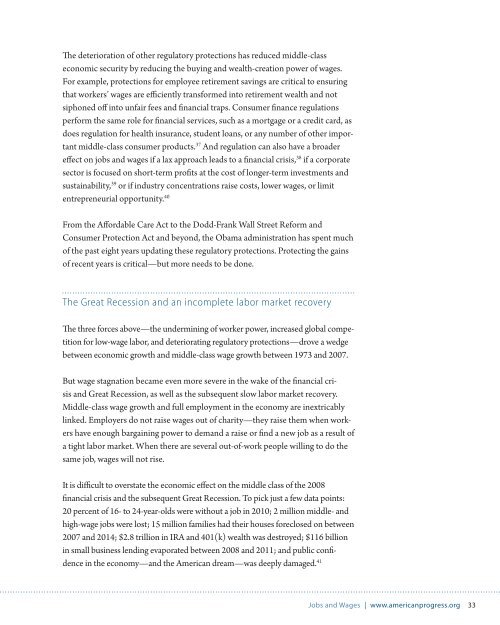AGENCY/PHOTOGRAPHER
RaisingWagesRebuildingWealth
RaisingWagesRebuildingWealth
You also want an ePaper? Increase the reach of your titles
YUMPU automatically turns print PDFs into web optimized ePapers that Google loves.
The deterioration of other regulatory protections has reduced middle-class<br />
economic security by reducing the buying and wealth-creation power of wages.<br />
For example, protections for employee retirement savings are critical to ensuring<br />
that workers’ wages are efficiently transformed into retirement wealth and not<br />
siphoned off into unfair fees and financial traps. Consumer finance regulations<br />
perform the same role for financial services, such as a mortgage or a credit card, as<br />
does regulation for health insurance, student loans, or any number of other important<br />
middle-class consumer products. 37 And regulation can also have a broader<br />
effect on jobs and wages if a lax approach leads to a financial crisis, 38 if a corporate<br />
sector is focused on short-term profits at the cost of longer-term investments and<br />
sustainability, 39 or if industry concentrations raise costs, lower wages, or limit<br />
entrepreneurial opportunity. 40<br />
From the Affordable Care Act to the Dodd-Frank Wall Street Reform and<br />
Consumer Protection Act and beyond, the Obama administration has spent much<br />
of the past eight years updating these regulatory protections. Protecting the gains<br />
of recent years is critical—but more needs to be done.<br />
The Great Recession and an incomplete labor market recovery<br />
The three forces above—the undermining of worker power, increased global competition<br />
for low-wage labor, and deteriorating regulatory protections—drove a wedge<br />
between economic growth and middle-class wage growth between 1973 and 2007.<br />
But wage stagnation became even more severe in the wake of the financial crisis<br />
and Great Recession, as well as the subsequent slow labor market recovery.<br />
Middle-class wage growth and full employment in the economy are inextricably<br />
linked. Employers do not raise wages out of charity—they raise them when workers<br />
have enough bargaining power to demand a raise or find a new job as a result of<br />
a tight labor market. When there are several out-of-work people willing to do the<br />
same job, wages will not rise.<br />
It is difficult to overstate the economic effect on the middle class of the 2008<br />
financial crisis and the subsequent Great Recession. To pick just a few data points:<br />
20 percent of 16- to 24-year-olds were without a job in 2010; 2 million middle- and<br />
high-wage jobs were lost; 15 million families had their houses foreclosed on between<br />
2007 and 2014; $2.8 trillion in IRA and 401(k) wealth was destroyed; $116 billion<br />
in small business lending evaporated between 2008 and 2011; and public confidence<br />
in the economy—and the American dream—was deeply damaged. 41<br />
Jobs and Wages | www.americanprogress.org 33


